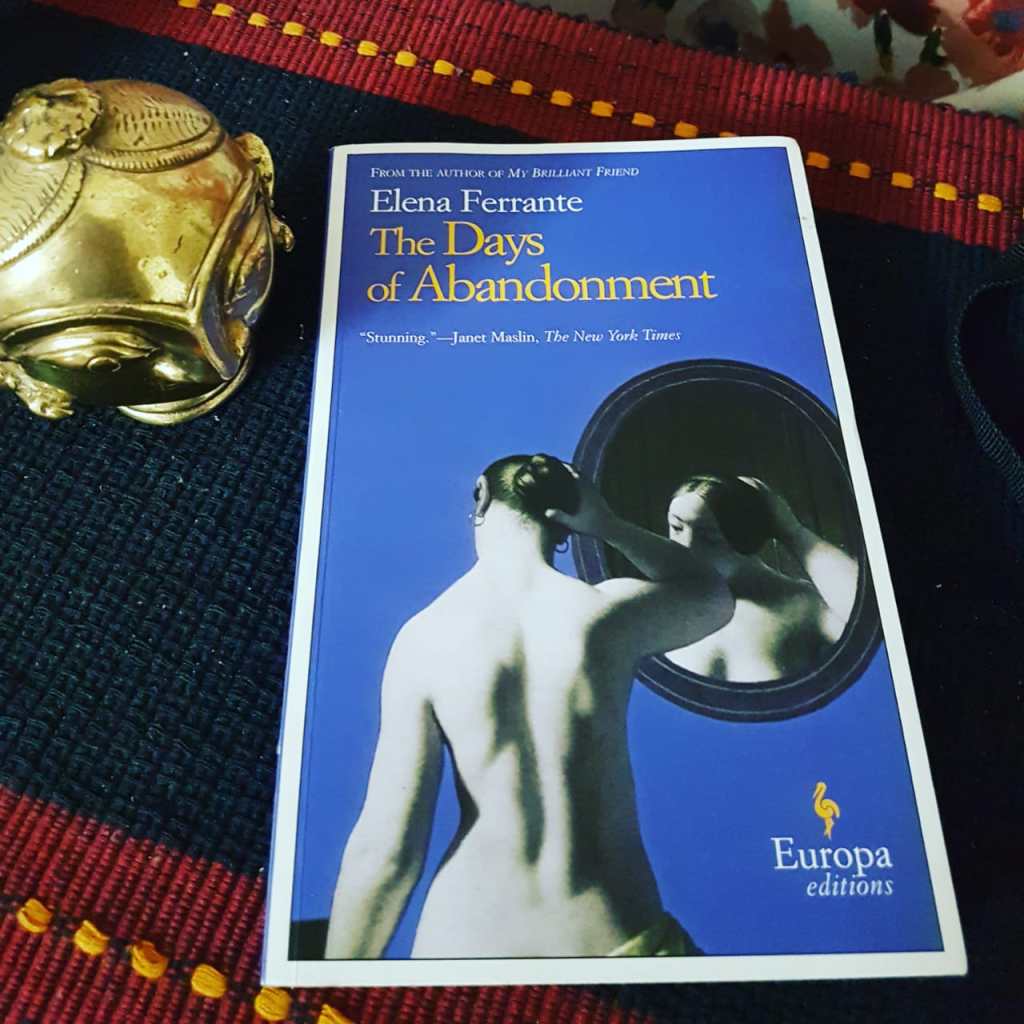Last year, I read the four Neapolitan Novels by Elena Ferrante and I was blown away. Not surprisingly, the books found a place on my Best of 2019 list, and I was keen to explore some of her standalone works.
The Days of Abandonment was the one that was calling out to me and I also felt it was a perfect fit for “Novellas in November” (#NovNov)

The Days of Abandonment is a vivid, visceral tale of a woman’s descent into despair after she is abandoned by her husband.
From the very first page, Olga (our narrator) is devastated when Mario, her husband, communicates his intention to leave her.
One April afternoon, right after lunch, my husband announced that he wanted to leave me. He did it while we were clearing the table; the children were quarreling as usual in the next room, the dog was dreaming, growling beside the radiator. He told me that he was confused, that he was having terrible moments of weariness, of dissatisfaction, perhaps of cowardice. He talked for a long time about our fifteen years of marriage, about the children, and admitted that he had nothing to reproach us with, neither them nor me.
At the time, Mario does not give any explicit reason, other than the fact that it’s all too much for him and he wants to leave. While Olga is shocked, she also feels certain that this is only a phase – Mario had expressed this very intention many years ago, only to come back to her again.
Olga, meanwhile, must grapple with the day to day life of taking care of her two children – Gianni and Illaria – and their dog Otto, while managing the house and paying the bills. They reside in Turin. At the same time, Olga refuses to accept Mario’s abandonment, and spends every waking moment trying to figure out what went wrong, and what needs to be done so that he comes back. But when she somehow learns that Mario has deserted her for another woman, Olga loses control.
Seething with anger and immense rage, Olga goes on the offensive – she speaks roughly with her friends and acquaintances, hurls abuses and resorts to foul language when interacting with others, and at one time even physically attacks Mario when she spots him with his new love Carla, in a shop.
Thereby begins Olga’s downward spiral into depression and gross neglect. Finding herself standing at the edge of a precipice and staring into an abyss, Olga struggles to adapt to the cruelly altered circumstances of her life.
At times when examining her situation, Olga is haunted by the image of the poverella (poor woman), a dominant presence in her childhood. The poverella in question was also abandoned by her husband and reduced to a state of utter despair, cutting a pathetic figure. Olga, at the time, vows never to slip into the same situation, but in her present sorry state, she can’t help but identify herself with that woman.
As the days go on, completing household chores, performing the duties of a mother, and tackling other practical problems of everyday life begin to take its toll on Olga as she overwhelmingly feels she is trudging through wet cement.
Don’t succumb, I goaded myself. Fight. I feared above all my growing incapacity to stick to a thought, to concentrate on a necessary action. The abrupt, uncontrollable twists frightened me. Mario, I wrote, to give myself courage, had not taken away the world, he had taken away only himself. And you are not a woman of thirty years ago. You are of today, take hold of today, don’t regress, don’t lose yourself, keep a tight grip.
She starts faltering, until one day things simply hit rock bottom. Has Olga reached a point of no return? Or, will she succeed in climbing out of this hole, and clawing her way back?
I was not the woman who breaks into pieces under the blows of abandonment and absence, who goes mad, who dies. Only a few fragments had splintered off, for the rest I was well. I was whole, whole I would remain. To those who hurt me, I react giving back in kind. I am the queen of spades, I am the wasp that stings, I am the dark serpent. I am the invulnerable animal who passes through fire and is not burned.
What stands out in The Days of Abandonment is Olga’s voice – she is brutally frank in conveying her thoughts and feelings, minces no words, and is almost always angry, sometimes uncomfortably so. She is immensely self-aware in a way that is fascinating and compelling. At its core, the novel touches upon the themes of how absurd conventional definitions of womanhood can be, while also highlighting the trials of motherhood. As readers, we are forced to wrestle with our feelings, because while Olga’s neglect of her children in her dark days can be hard to fathom, we also can’t help but empathize with her.
The Days of Abandonment, then, is in many ways an apt title for this powerful novella. On one level, it refers to the obvious fact of Mario leaving Olga. But, on another level, it also conveys a sense that Olga is losing her identity, that her sense of self has merged with that of the poverella, and that there is not much to separate the two women.
The Days of Abandonment is a great entry point for those who have never read Ferrante’s books before and do not want to commit to her Neapolitan Quartet yet, although I do think the latter is much superior.

4 thoughts on “The Days of Abandonment – Elena Ferrante (tr. Ann Goldstein)”